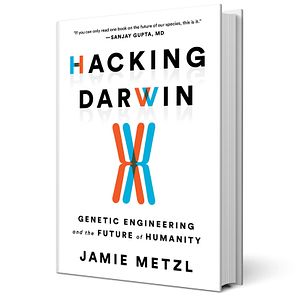Trans-Pacific View author Mercy Kuo regularly engages subject-matter experts, policy practitioners and strategic thinkers across the globe for their diverse insights into the U.S. Asia policy. This conversation with Dr. Jamie Metzl – technology futurist, geopolitical expert media commentator, senior fellow of the Atlantic Council, and author of Hacking Darwin: Genetic Engineering and The Future of Humanity (Sourcebooks 2019) – is the 207th in “The Trans-Pacific View Insight Series.”
With China featured prominently in your book, explain China’s leading role in artificial intelligence and implications for genetic engineering.
China is not the leading country in developing basic science of genetic engineering but the most aggressive in applying genomics in business, education, government and defense. These technologies move extremely rapidly and are subject to abuse in light of China’s “move fast and break things” culture.
Compare China’s efforts to unlock the secrets of the genome with those of the United States and other countries.
The Chinese government clearly recognizes that unlocking secrets is a first step in establishing leadership in unlocking the genomics revolution, general, predictive, preventative healthcare, and a fundamental revolution in assisted reproduction. In 2004, only four clinics in China had a license to perform preimplantation genetic testing (PGT). By 2016, the number had risen to 40. One single clinic in Changsha, a city near Beijing, reported 41,000 IVF [in vitro fertilization] procedures in 2016, a quarter of the total number carried out in the entire United States and more than in the entire United Kingdom that same year.
Explain the national security and biowarfare implications of genetic engineering.
The genetics revolution will have fundamental national security implications. The country that leads the genetic revolution will have an economic advantage over other countries. We must understand that the possibility of a human race arms race is very real. Countries will be competing with each other to use genetic technologies to produce competitive societies to enhance military leadership. Genetic engineering is also being used in biological warfare and for all sorts of nefarious purposes. Since development and utilization of this technology is in itself inherently value-free, it is up to the global community to define values and guidelines to guide the use of these technologies.
Explain the ethical differences between Chinese and western approaches to genetic engineering?
The Chinese government tends to look at many challenges as engineering challenges. The one-child policy, Three Gorges dam, environmental engineering, Olympic sports schools and so on are all examples of this. Genetic engineering is the amalgamation of biology and engineering. Human biology is not infinitely complex, just massively so. China’s faith in engineering increases the potential that powerful genetic engineering technologies could be misused.
At its core, the coming debate over human genetic engineering will be a debate about how far we as a species – made up of many diverse groups with very different views on whether and how much to alter the biology bequeathed to us by evolution – will go. These types of distinct philosophies about our relation to nature have played out very differently in various societies in our contentious debates over genetically modified crops. If we thought genetically modified crops was an issue, what until we’re fighting over the future of genetically modified humans.
Why should the future of genetic engineering concern U.S. policymakers?
The genetics revolution will be most transformational phenomenon of our time, fundamentally impacting our healthcare, how we see ourselves, and the global balance of power. The U.S. government has begun to recognize that artificial intelligence is a domain with national security implications, but not yet for genetic engineering. It may end up being the case that China’s massive investment in AI, efforts to promote national leadership in life sciences and biotechnology, and ability to bring together massive data sets of sequenced people paired with full access to their electronic medical records will put China in the pole position in global efforts to decode the human genome, transform health care, and lead the global genetics revolution. It could alternately be the case that greater privacy protection in the United States and Europe will lead to stronger and more coherent societies, higher standards of genetic and other data collection, and more quality discoveries. It is imperative for the U.S. policy community to recognize the security implications of AI and genetic engineering to get ahead of the curve rather than wait for a crisis to spur our action.































